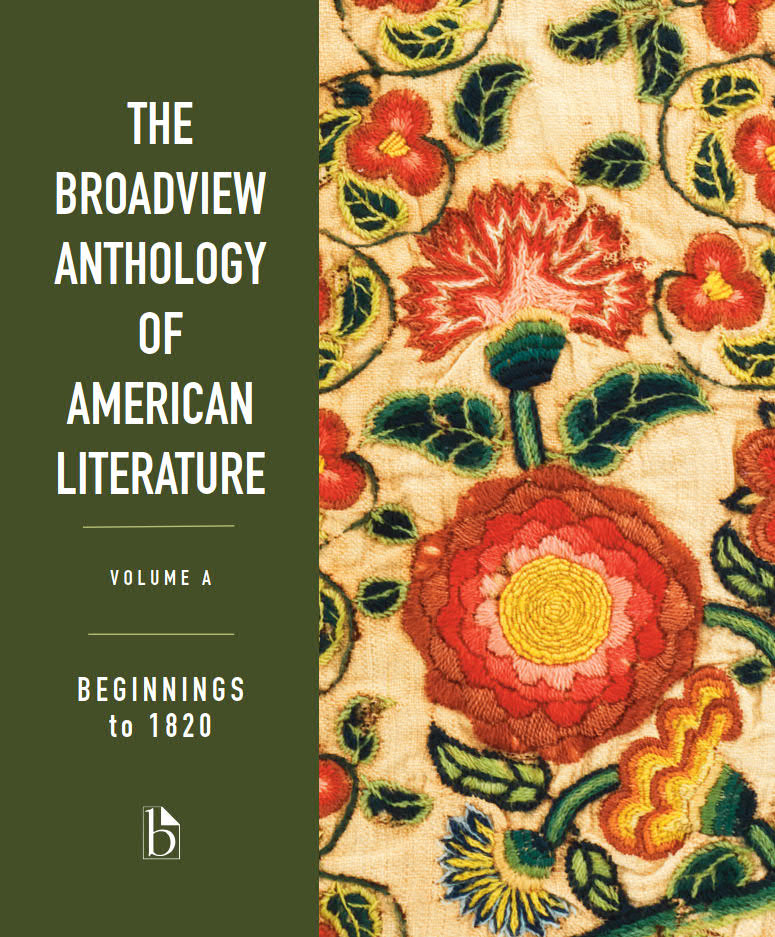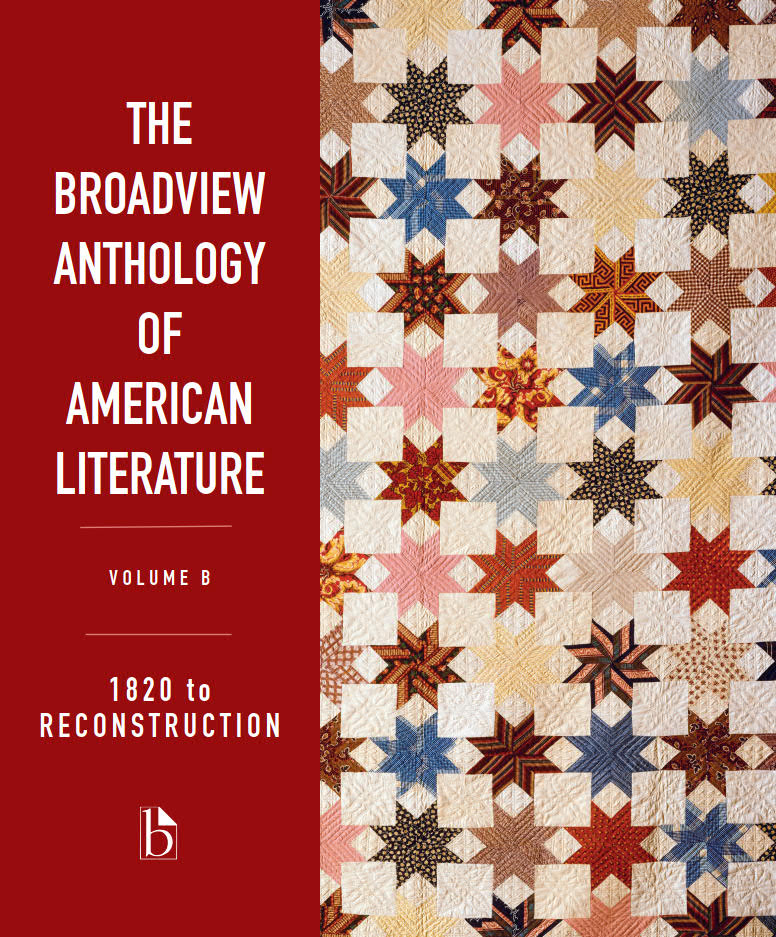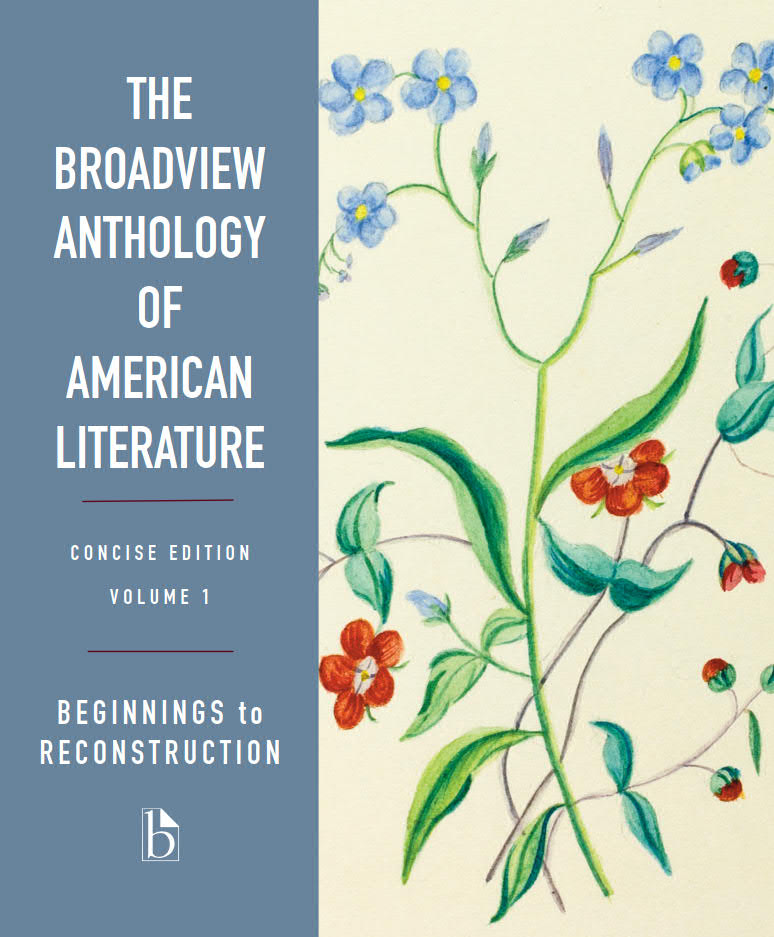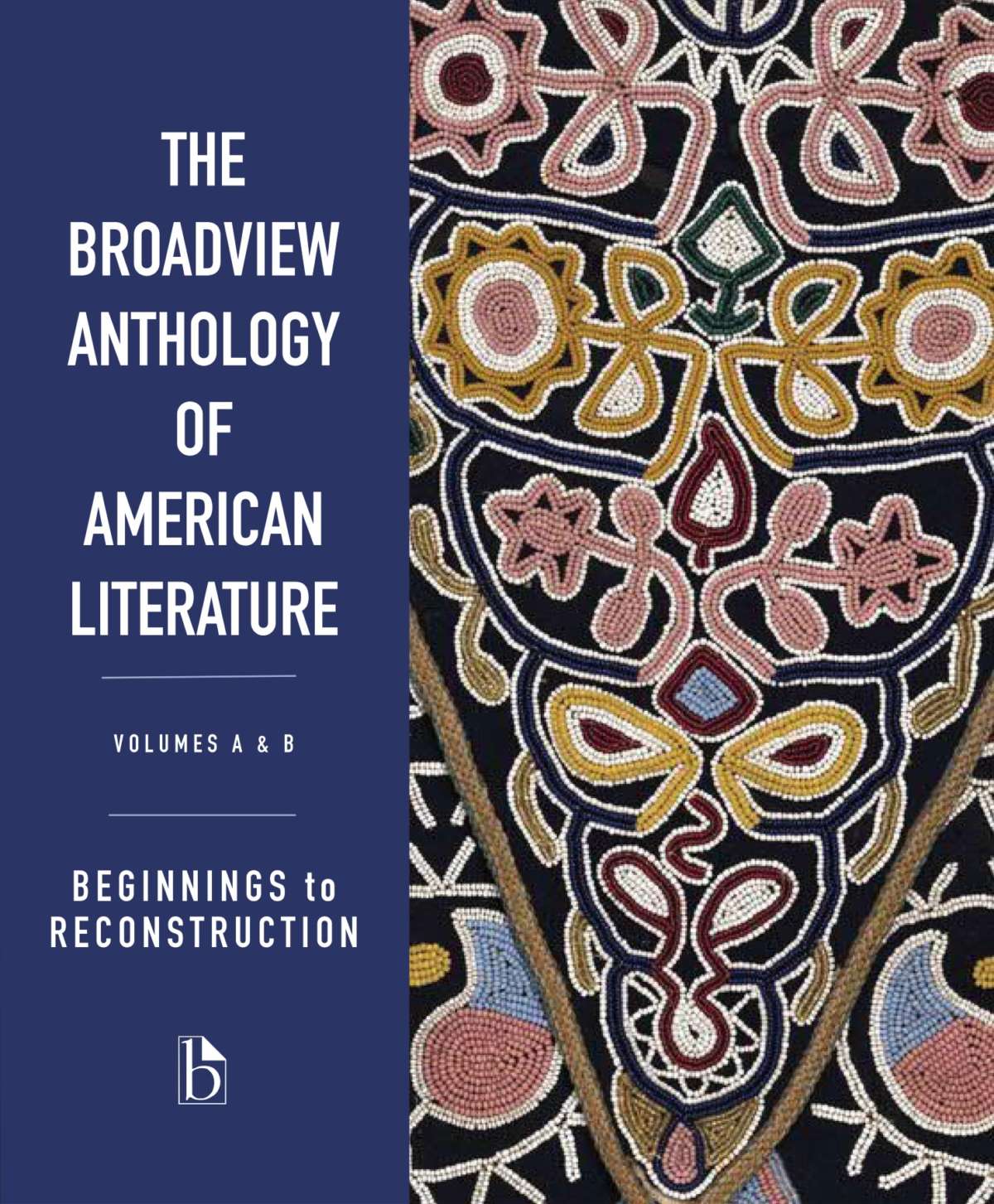The Broadview Anthology of American Literature
“… quite simply, a breakthrough … the new gold standard …” — Michael D’Alessandro, Duke University
“… a literary anthology for a new generation …” — Hester Blum, Pennsylvania State University
“…this anthology stands out above all others for its ability to make the case … that teaching these surveys remains essential, productive, and meaningful educational work.” — John Earnest, University of Delaware, in American Periodicals
“… a game changer in the study of American literature. I love it!” — Venetria K. Patton, University of Illinois at Urbana-Champaign
“… it never forgets its most important audience: students.” — Michael C. Cohen, UCLA
The Broadview Anthology of American Literature Volume A: Beginnings to 1820, Volume B: 1820 to Reconstruction, and Concise Volume I: Beginnings to Reconstruction are all available in print and digital formats. To request a copy, please write to examcopies@broadviewpress.com. If you would like to discuss how our anthology can be customized for your class, please contact our Custom Text Coordinator at custom@broadviewpress.com.
General Editors
Derrick R. Spires, Cornell University
Christina Roberts, Seattle University
Joseph Rezek, Boston University
Justine S. Murison, University of Illinois, Urbana-Champaign
Laura L. Mielke, University of Kansas
Christopher Looby, UCLA
Rodrigo Lazo, UC Santa Cruz
Alisha Knight, Washington College
Hsuan L. Hsu, UC Davis
Rachel Greenwald Smith, Saint Louis University
Michael Everton, Simon Fraser University
Christine Bold, University of Guelph
Key Features
The Broadview Anthology of American Literature represents a substantial reconceiving of the canon of American literature.
Content
- Strong foundation in current scholarship, including particular attention to issues of race, gender, class, and sexual orientation.
- Broader and more extensive coverage of African American oral literature and Indigenous oral and visual literature than in competing anthologies.
- More extensive and more helpful annotations than in competing anthologies.
- Comprehensive introductions to periods and to authors, providing essential background.
- Close attention paid to links between the United States and the rest of the Americas, especially Latin America and the Caribbean.
- More visual and print-cultural materials than in competing anthologies.
- Major canonical works presented in full include Mary Rowlandson’s captivity narrative; The Coquette; Narrative of the Life of Frederick Douglass, An American Slave; and Benito Cereno.
- Full author sections in the bound book volumes are devoted to often-underrepresented figures such as the following: Anne Hutchinson, Sor Juana Inés de la Cruz, Briton Hammon, Venture Smith, Lucy Terry, Sagoyewatha (Red Jacket), Tecumseh, and Elizabeth Ashbridge (Volume A); George Moses Horton, Jane Johnston Schoolcraft, José María Heredia, Black Hawk, Sojourner Truth, James Whitfield, Martin Delany, Fanny Fern, William Wells Brown, David Walker, and John Rollin Ridge (Volume B).
- Canonical authors are looked at with fresh eyes: selections in the bound books and website include excerpts from Bradstreet’s Meditations, Divine and Moral; Franklin’s “Sidi Mehemet Ibrahim on the Slave Trade” and “Drinking Song”; Rowson’s Slaves in Algiers; Irving’s “The Wife”; Sedgwick’s “Cacoethes Scribendi”; excerpts from Longfellow’s The Song of Hiawatha; excerpts from Thoreau’s A Yankee in Canada; Whitman’s “Song of the Redwood Tree”; and excerpts from Melville’s The Confidence Man and the full text of his Encantadas.
- Includes literature through the Reconstruction era, reflecting increasing scholarly emphasis on the ongoing legacy of slavery after the end of the Civil War. (Reconstruction material will also be included in the anthology’s third volume.)
Contexts
- Illuminating contextual materials provided for key authors and works.
- In-depth sections on such topics as “Slavery in Early America,” “Nature and the Environment,” “Expansion, Native American Expulsion, and Manifest Destiny,” “Gender and Sexuality,” and “Nineteenth-Century Oratory.”
Online Component
- Wide range of additional authors, works, and contextual materials provided as part of the anthology’s online component: selections include topics such as “Immigration and Indentured Servitude” and author entries on such writers as Catharine Brown, Ukawsaw Gronniosaw, Mary Jemison, Sarah Kemble Knight, Mary Ann Shadd, John Marrant, Frances Sargent Locke Osgood, Robert Montgomery Bird, Elizabeth Stoddard, and E.D.E.N. Southworth.
Formats
- Large trim-size, two-column format, allowing for side-by-side presentation of different versions of certain texts. (Several of Dickinson’s poems are presented in this way, as is the Declaration of Independence; several Spanish-language selections are presented in facing-column translation.)
- Ebooks available for all volumes
- Custom print and etexts available
- Broadview offers an extensive list of stand-alone editions that can be packaged with the anthology for only $5. Browse our complete list of available editions in American literature.
Inclusive Access
- The anthology is available for Inclusive Access (First Day) programs.
Student Resources:
- A wealth of online readings edited according to the same principles as the material included in the bound book; audio selections; an interactive timeline; 70 historical maps; a guide to reading poetry; a poetry glossary.
Instructor Resources
- Notes on approaches to teaching, organized succinctly for quick navigation; sample syllabi; and themed groupings of anthology selections.
What People Are Saying
“The expansion, diversification, and revitalization of the texts and terms of American literary history in recent years is made marvelously accessible in the monumental new Broadview Anthology of American Literature. This is a literary anthology for a new generation, one that meets students where they live: both on the printed page and online. The introduction and notes feature a new generation of scholars, as well, to refreshing effect. In one consequential example, the Broadview Anthology does not see the Civil War as a hard break in nineteenth-century literary history, but as part of a continuum that extends through the failed promises of Reconstruction. I will be teaching with this Anthology, and am confident that my classes will be greatly enriched by its capacious vision.”
— Hester Blum, Pennsylvania State University
“The Broadview Anthology is, quite simply, a breakthrough. From reproducing essential canonical texts to recovering unjustly forgotten ones, the editors offer a remarkably panoramic collection of American literature. The introductions and contexts provide new, enlightening frameworks for the literary works themselves. Just as important, the supplementary materials build a persuasive case for the project’s urgency. Here, the editors suggest, is an American literature that absorbed, reflected, and ultimately transformed the history surrounding it. Meticulously researched and expertly assembled, the Anthology should be the new gold standard for scholars and teachers alike.”
— Michael D’Alessandro, Andrew W. Mellon Assistant Professor of English and Theater Studies, Duke University
“I am eager to teach with this anthology! It aligns with cutting-edge research through its selections, its introductions, and explanatory notes, and the texts are supplemented with primary documents that encourage teachers and students to think critically and dynamically.”
— Koritha Mitchell, The Ohio State University
“The Broadview Anthology of American Literature breathes new life into the early American literature survey. Framed by expert commentary and invaluable contextual materials, its selections present early American literature in all its rich, weird, inviting abundance. Readers will immediately notice that it contains many more selections by writers of color than similar anthologies, but the value of its approach goes beyond inclusion: it demonstrates how the history of early American literature is inseparable from the histories of colonialism, slavery, and racism.
“The anthology gives contemporary readers a view of early American literature as it existed historically, with unprecedented attention to the vibrant worlds of popular writing, oral literature, and visual culture that a focus on canonical authors tends to eclipse. At the same time, the anthology pulls forward writers, largely ignored in their own times, who speak resoundingly to the present. So much thought has been put into every aspect of the Broadview Anthology of American Literature, from the selection of texts to their organization to their presentation on the page; it will be a gift to classrooms for years to come.”
— Lara Langer Cohen, Swarthmore College
“The Broadview Anthology of American Literature promises to be a dynamic addition to the genre—I’m very much looking forward to teaching from it.”
— Michael Borgstrom, San Diego State University
“The Broadview Anthology of American Literature sweeps impressively across vast early America to create one of the most wide-ranging, comprehensive, and generously illustrated anthologies available. The multiplicity of early American locations, languages, and genres is here on wondrous display. Its unique hybrid format connects printed texts with digital supplements, offering a volume that can be used both as an introduction to the field and as a guide to further research.”
— Jordan Alexander Stein, Fordham University
“I’m very excited to teach from this new anthology!”
— Megan Walsh, St. Bonaventure University
“Above all, this is a volume for the 21st century. Hemispheric, multi-generic, vibrantly illustrated, and employing a hybrid format that encourages instructors and students to customize their experiences, this anthology is dynamic. Its capaciousness and ample resource materials make for a text that is always evolving and meeting its readers in new ways.”
— Russ Castronovo, Tom Paine Professor of English and Dorothy Draheim Professor of American Studies, University of Wisconsin-Madison
“… [M]y students LOVE The Broadview Anthology of American Literature. I am also so impressed with it—the emphasis on colonization/decolonization, the selections, the INTRODUCTIONS AND HEADNOTES!! It’s a superb anthology, and I’m looking forward to using it for many, many years. … The anthology is a triumph. It truly is.” — Rebecca Bravard, Florida Southern College
“Big and bold… an important new option for teachers and students of American literature.”
— Maurice Lee, Boston University
“To produce an anthology of the literatures and cultures of the United States in 2022 is a monumental challenge. Volumes A and B have wonderful choices, with the benefit of adding much more material through online links. The choices that the editors have made about popular culture and race are really welcome in this age of resistance to critical race theory. They include the thought provoking placement of oral traditions with the first 25 entries involving ‘first nations’ narratives. The significant balance of genres includes good illustrations. There’s a great selection from familiar writers such as Emily Dickinson and Walt Whitman. And the noncanonical material includes an inviting introduction (for many readers) of once popular writers like Henry Wadsworth Longfellow and Fanny Fern.
“The choice to break the periodicity of the volumes at 1877, at the end of the time still known euphemistically as ‘reconstruction,’ provides a welcome challenge to the tradition of understanding the national identifications as ‘antebellum’ and ‘postbellum.’”
— Shirley Samuels, Cornell University
“As Frederick Douglass’s experience teaches, an anthology, at its best, can be a point of entry into a world of literary expression, powerful and empowering. The Broadview Anthology of American Literature is exactly this. It is a rich collection that reflects the diversity of American literatures, and scholars and teachers will find in it many new and exciting ways to think differently about literary history. What I like most about this anthology, though, is that it never forgets its most important audience: students. There is a wealth of material here that will help them imagine and reimagine what American literature could be.”
— Michael C. Cohen, UCLA
“These two anthologies are by far the best of their kind I have seen. The range and diversity of authors, the rich historical contextualizations, the important and well-curated thematic ‘Contexts’ sections, and the careful and capacious scholarly insight that clearly animates the entire project make the volumes a superior choice for courses on colonial and US writing up through the nineteenth century and for nonacademic readers who seek insight into these periods.”
—Mark Rifkin, University of North Carolina, Greensboro
“The Broadview Anthology of American Literature is an instructor’s dream for introducing students to the diversity and complexity of American literature. I particularly appreciate how the format of the volumes creates new teaching opportunities, such as the practice of providing different versions of a text or translations of texts side by side to facilitate comparison. The many images add to the texture of the anthology, and include copies of illustrations from the texts as well as newspaper clippings and other pertinent visuals to provide important context for the selections. This anthology is definitely a game changer in the study of American literature. I love it!”
— Venetria K. Patton, Dean, College of Liberal Arts & Sciences and Professor of English and African American Studies, University of Illinois at Urbana-Champaign
“Canons are problems. They are also possibilities. Which is to say, canons are never the answer, even as they are always an answer. Canons should always be abolished, even as they can never be abolished. I find myself taken aback by, and quite thrilled with, the way Broadview Press’s new, two-volume anthology of American Literature embodies the problematic possibilities of the canon. This anthology offers a thorough revision of the American literary canon, while also providing many opportunities for readers to unsettle and overturn the very idea of the American, the literary, and the canon. It is breathtakingly comprehensive, thanks to the vast erudition of the many editors and advisors who have co-authored and co-assembled its pages. It also creatively combines print and online resources, source texts and commentary, in ways that do justice to histories of the book, pre-histories of the book, post-histories of the book, and ante-histories of the book. Readers will find texts they know well, and texts they have never known. Let us read and re-read the Broadview Anthology of American Literature, then, for all the problems and possibilities it so brilliantly offers us.”
—David Kazanjian, Professor of English and Comparative Literature, University of Pennsylvania
“The breadth and scope are truly phenomenal. But what I appreciated most about these new volumes were the images! I particularly loved the historical maps, so many and so interesting throughout, the images really helped to visualize the literature and I think this is worth noting about these anthologies, it makes a difference to me to see the words illuminated by the pictures.”
— Tess Chakkalakal, Associate Professor of Africana Studies and English, Bowdoin College
“[We have] stuck for years to the same basic format [for anthologies]: tiny print, crammed pages, and a weighty tome. The new Broadview, while still weighty, does not feel crammed. It uses double columns and wide pages to make the text seem almost inviting. I might pick this text over others on that basis alone, hoping it would lessen students’ dread when they start to read. But beyond a better feel, the double column [format] also enables comparisons of related texts and side-by-side translations… A change in format may seem small, but it makes a big difference.…
Several principles of selection [have been used]…: keeping the most-taught texts, adding space for once-popular authors…, and pushing forward some writers who [the editors] believe ‘deserve to be more widely taught’ or who ‘have been unjustly neglected.’ The end result is an extraordinary display of the well-known and the little-considered. To make space for so much material, the anthology includes a large website portion, edited like the physical text. Altogether, the anthology offers a remarkable collection with good online teaching aids, stunning visuals, and a powerful emphasis on the inclusion of voices from every part of America. …
[T]he history that comes to the fore in this anthology is the history most needed now….
… [I]f I teach from this anthology, as I think I will, I will be pulling a good deal from the online selections…. I will also want to use the online material about genre and form…. I will find myself with too much to teach and not enough time or space to do it. The new Broadview manages that difficulty by having a main emphasis to guide the printed selections, while making other points of focus available online.”
— Abram Van Engen, Early American Literature
“Guided by an out-standing team of General Editors, the Broadview Anthology is, one might argue, not merely another compilation of selections from American literature. Rather, it is an anthology (supplemented by online readings, audio selections, and an interactive timeline) that allows teachers to guide students into the various roles that works of literature and expressive culture have played in the process of American cultural history. Richly illustrated, with deep attention to such concerns as race, gender, class, and sexual orientation, and expertly edited and annotated, this anthology stands out above all others for its ability to make the case not only that surveys of American literature are still worth teaching but also that teaching these surveys remains essential, productive, and meaningful educational work.”
— John Earnest, University of Delaware, in American Periodicals
Sample Selections
Click the links below to access PDF samples of The Broadview Anthology of American Literature.
Preface to The Broadview Anthology of American Literature
Washington Irving
Olaudah Equiano
Sor Juana
William Bradford
Civilizations in Contact: The Caribbean
William Apess
Rebecca Harding Davis
Emily Dickinson
Herman Melville
Frederick Douglass
David Walker
Contexts: Expansion, Native American Expulsion, and “Manifest Destiny”
Volumes and Format
Now Available:
Volume A: Beginnings to 1820
Volume B: 1820 to Reconstruction
Volumes A & B: Beginnings to Reconstruction (discounted two-volume package)
Concise Volume 1: Beginning to Reconstruction (shorter single volume covering the same period as volumes A and B)
Materials from the anthology can be used to create a digital or print custom text that includes only your chosen readings. We offer an easy and intuitive Custom Text Builder, or you may build your text in collaboration with our Custom Text Coordinator at custom@broadviewpress.com.
Volumes covering Reconstruction to the present are forthcoming soon.




